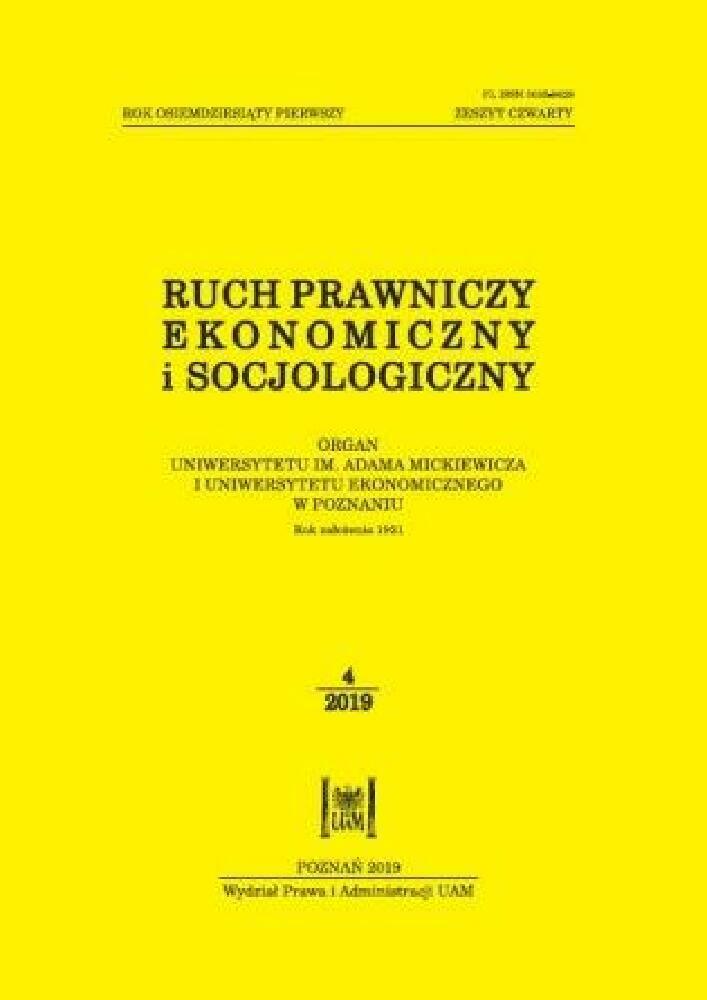Abstract
The power of attorney to perform a particular legal act must be considered on two levels: general and specific. The former refers to granting the power of attorney, thus the capacity of a principal to authorize someone else to represent him or her. The latter relates to the capacity of a principal to perform a legal act to which he or she authorized an attorney-in-fact. Limitation of legal capacity or loss of subjective right (for example property rights) do not affect the power of attorney (it does not expire). The full incapacitation of a principal, however, leads to the expiration of the power of attorney. The interests of the principal are in each case duly protected: in the event of the principal’s incapacitation an attorney-in-fact acts as the alleged attorney-in-fact – falsus procurator (the act performed by the alleged attorney-in-fact is void or voidable and its validity depends on confirmation by a statutory representative under Article 103 para. 1 of the Polish Civil Code); in the event of limitation of the legal capacity of the principal (partial incapacitation) – a legal act performed by an attorney-in-fact is subject to the control of a statutory representative (just like an act carried out by a person with limited capacity for legal acts – pursuant to Article 18 para. 1 of the Polish Civil Code) and sometimes also requires authorization for a court (Article 101 para. 3 of the Polish Family and Guardianship Code); in the event of the loss of the subjective right by a principal, a disposition of that right conducted by an attorney-in-fact will generally have no effect (unless for instance the prerequisites for acquisition of that right in good faith are met).
References
Ernst, U., Rachwał A., Zoll, F. (2013). Prawo cywilne. Część ogólna. Warszawa.
Fabian, J. (1963). Pełnomocnictwo. Warszawa.
Gawlik, B. (1985). Przedstawicielstwo, [w:] S. Grzybowski (red.), System prawa cywilnego. Tom 1: Część ogólna. Wrocław–Warszawa–Kraków–Gdańsk–Łódź: 728–790.
Grykiel, J. (2018). Komentarz do art. 96 k.c., nb. 35–38, [w:] M. Gutowski (red.), Kodeks cywilny. Tom 1: Komentarz do art. 1–352. Warszawa: nb. 35–38.
Grzybowski, S. (1974). System prawa cywilnego. Tom 1: Część ogólna. Wrocław–Warszawa–Kraków–Gdańsk.
Grzybowski, S. (1985). Czynności prawne. Zasady ogólne, [w:] S. Grzybowski (red.), System prawa cywilnego. Tom 1: Część ogólna. Wrocław–Warszawa–Kraków–Gdańsk–Łódź: 475–511.
Jedliński, A., Jedlińska, M. (2018). Pojęcie zastępstwa w prawie cywilnym materialnym (artykuł dyskusyjny). Rejent 1(321): 39–64.
Osajda, K. (2017). Komentarz do art. 1097 k.c., nb. II, [w:] K. Osajda (red.), Tom 1: Kodeks cywilny. Komentarz. Część ogólna. Przepisy wprowadzające KC. Prawo o notariacie (art. 79–95 i 96–99). Warszawa: 796.
Pazdan, M. (2012). Osoby fizyczne, [w:] M. Safjan (red.), System prawa prywatnego. Tom 1: Prawo cywilne – część ogólna. Warszawa: 1047–1114.
Pazdan, M. (2019). Przedstawicielstwo, [w:] Z. Radwański, A. Olejniczak (red.), System prawa prywatnego. Tom 2: Prawo cywilne – część ogólna. Warszawa: 588–693.
Słyk, J. (2019). Komentarz do art. 101 k.r.o., nb. 25, [w:] K. Osajda (red.), Kodeks rodzinny i opiekuńczy. Komentarz. Legalis/el.
Smyk, M. (2010). Pełnomocnictwo według kodeksu cywilnego. Warszawa.
Soczyński, M. (2005). Wygaśnięcie pełnomocnictwa. Rejent 10(174): 119–131.
Sołtysiński, S. (1985). Czynności rozporządzające. Przyczynek do analizy podstawowych pojęć cywilistycznych, [w:] J. Błeszyński, J. Rajski (red.), Rozprawy z prawa cywilnego. Księga pamiątkowa ku czci Witolda Czachórskiego. Warszawa: 301–330.
Szwaja, J., Mika, I.B. (2009). Prokura, [w:] S. Włodyka (red.), System prawa handlowego. Tom 1: Prawo handlowe – część ogólna. Warszawa: 886–952.
Widerski, P. (2018). Pełnomocnictwo w prawie polskim. Warszawa.
License
Copyright (c) 2019 WPiA UAM

This work is licensed under a Creative Commons Attribution-NonCommercial-NoDerivatives 4.0 International License.





